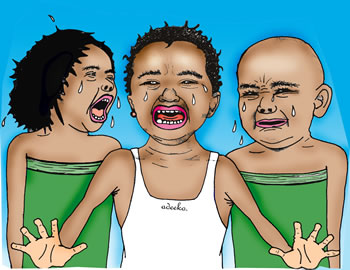I F any Nigerian or member of the international community had doubts about the sincerity and commitment of President Muhammadu Buhari to the rescue of our precious daughters abducted by Boko Haram insurgents at Government Secondary School, Chibok on April 14, 2014, the rescue of all other abducted Nigerians and very importantly, his sincerity in working towards ending the Boko Haram insurgency, such doubts must by now be laid to rest.
— Governor Kashim Shettima of Borno State
ThIS comment by the Borno State governor, Alhaji Kashim Shettima, has captured the electrified mood of celebrations in Nigeria and the international community over the release of 21 Chibok schoolgirls captured by Boko-Haram terrorists on April 14, 2014. Based on painstaking negotiations anchored by the International Red Cross and the Swiss government, these girls were released by their captors in the town of Banki, on the fringes of Nigeria’s border with Cameroon.
In Nigeria’s history, the nation has never lived with prolonged emotional trauma, which glued both friends and foes like the incident of the abduction of the 276 school girls in Chibok imposed on the nation. It triggered local and international outrage. World leaders took turns to renounce the act of the terrorists as barbaric and uncivilised.
The helplessness of the Federal Government under the then President Goodluck Jonathan, which showed more interest in his re-election campaigns exacerbated the tension. The birth of #BringBackOurGirls (BBOG) campaigners, led by Mrs. Obi Ezekwesili, ignited fresh trouble for the government, which was scolded daily for its refusal to initiate action for their release.
Centrally, there were other issues, but Muhammedu Buhari, as presidential candidate of the All Progressives Congress (APC) in the 2015 general elections, premised his campaigns on two main cardinal issues. He spoke vibrantly and angrily about ending the Boko Haram insurgency, ensuring the release of the abducted Chibok girls, and ridding Nigeria of her pervasive and debilitating corruption.
Nigerians trusted him and overwhelmingly voted him into power. In power, President Buhari has made no pretensions about the issue of defeating Boko Haram and securing the release of the Chibok girls, and the launch of a deafening anti-graft war.
Thus, Buhari started with the re-organisation of the Nigerian military, procurement of the arms and ammunitions, prompt payment of allowances of troops in the battle front to boost their morale and reaching out to the international community to plead for their assistance to battle terrorism.
The coming on board of the Chief of Army Staff (COAS) Gen. Tukur Buratai, among other Service Chiefs, renewed fresh songs on ending the Boko Haram insurgency. Specifically, Buratai promised to end the insurgency in the North East by December 2015. Nigerians waited doubtfully because other Service Chiefs had similarly bragged in the past, but it came to naught.
But the new face of leadership of the Nigerian military had proven to be different. By the December 2015 deadline the COAS promised, tales of Boko Haram’s raids on villages, communities and bombing of cities in the North turned into the narratives of terrorists fleeing, killed in combat, captured or surrendering to Nigerian military. Reclaimed territories from the insurgents began to experience normalcy and deserted communities breathed fresh air.
President Buhari announced to the congregation of the last United Nations General Assembly (UNGA) in New York that Nigeria had substantially decimated Boko Haram. The President further disclosed that their capacity to freely launch unbridled attacks on targeted locations had been diminished to occasional attacks on soft targets.
It gladdens the heart that President Buhari has kept faith with this campaign covenant with Nigerians by defeating the Boko Haram insurgency. His cake has been iced with the gradual release of the Chibok girls from the claws of the terrorists. It has raised a strong hope that the remaining Chibok girls still in captivity are nearer liberation too, as hinted by Buhari in Germany thus:
“In getting these 21 out, we hope we will get enough intelligence to go about securing the rest of them.”
What is indispensable in the release of the Chibok girls and the over 20, 000 Boko Haram abductees the Nigerian military has secured freedom at intervals is testimony of a hard working Nigerian military. It has worked in conjunction with the Multi-National Joint Task Force (MNJTF) and the complementary roles of the Civilian Joint Task Force (CJTF) to deflate the once enigmatic and agile terrorists from their safe enclaves in the Northeast.
However, it must be borne in mind that a blood thirsty beast, who is armed to the teeth, would not just voluntarily quit his trade for the fun of it, or because he has become a saint; repented upon his sudden discovery of God Almighty and His love. He relapses because of knowledge of his constant haunting by a superior power, potent enough to extinguish him and his generation.
The Nigerian Army, under General Buratai, has been very instrumental to instilling this psychology fear into the remnants of terrorists, which accounts for their discovery of the futility in the continued caging of the abductees. Other arms of the military also performed wonderful roles.
But soldiers consistently and exceptionally bore the brunt. They chased terrorists on foot, combat motorbikes and vehicles. They implanted themselves in communities for surveillance, had their command barracks attacked, detonated terrorists bombs, spent nights and days in forests and on roads at checkpoints, braved sun and rain as well as sacrificed their dear lives in the battle against insurgency.
Accordingly, Nigerian soldiers and other arms of the military deserve unrestrained respect and encouragement to keep the spirit alive. However, families of the Chibok girls still held in detention should be consoled by President Buhari’s assurances that the return of the 21 girls would definitely lead to the return of the rest still in captivity.
- Israel writes from the University of Ibadan.
WATCH TOP VIDEOS FROM NIGERIAN TRIBUNE TV
- Relationship Hangout: Public vs Private Proposals – Which Truly Wins in Love?
- “No” Is a Complete Sentence: Why You Should Stop Feeling Guilty
- Relationship Hangout: Friendship Talk 2025 – How to Be a Good Friend & Big Questions on Friendship
- Police Overpower Armed Robbers in Ibadan After Fierce Struggle





